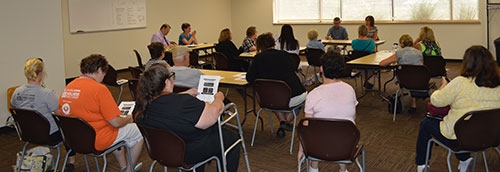You are here
Home ›Representative Patti Ruff hosts listening post to gather input on Iowa's Medicaid privatization

Patti Ruff of Iowa House of Representatives District 56 and State Senator Joe Bolkcom, Vice Chair of the Senate Human Resources Committee, co-hosted a listening post session in the Community Room at Robey Memorial Library in Waukon Wednesday, August 10 for the purpose of gathering information from the public in regard to the privatization of Medicaid that took place in the state of Iowa earlier this year. The meeting involved area health care and service providers, as well as individuals and families directly impacted by the Medicaid privatization, with many weighing in with their own personal experiences and frustrations with how the process has transpired since its inception in April this year. Photo by Joe Moses.
by Joe Moses
State Representative Patti Ruff of McGregor hosted a listening post sessions with northeast Iowa residents and health care providers at Waukon's Robey Memorial Library Community Room Wednesday, August 3 to discuss their concerns with Iowa's move to Medicaid privatization. Iowa moved to a privatized system April 1 of this year following a delay in receiving federal approval. The program change was originally planned with a January 1 start date.
“I’ve heard from several Iowa families and health care providers who have issues with Medicaid privatization,” said Ruff. “Our goal is to gather more information from local citizens and provide more information and answers to those who are affected.”
Privatization has resulted in Mayo services in Rochester, MN and Gundersen services in La Crosse, WI to no longer get reimbursement through Iowa's Medicaid program, according to information shared at the Wednesday session. Rep. Ruff said that she had attempted to create an amendment during the privatization roll-out that would allow Iowans to utilize services outside of their state. "Since implementation, we are to a point where a quarter of all claims are being denied, the goal of DHS is to have that number below 10 percent," she mentioned at the beginning of the meeting.
Ruff provided information from a recent survey of area service providers that reveals that 28% of those providers surveyed have been forced to take out loans to cover expenses because they are not being reimbursed in a timely manner. Further survey information indicates that 46% of the providers are planning on reducing services. In addition, 38% of Medicaid patients are not able to continue seeing their specialty providers out of network, and 61% of service providers have stated that Medicaid privatization has decreased the quality of services that they can provide.
State Senator Joe Bolkcom of Iowa City, Vice Chair of the Senate Human Resources Committee, was present with Rep. Ruff to answer questions and hear concerns from health care providers and residents as well. The three managed care organizations (MCOs) were invited to participate in the discussion but have decided to no longer be involved in these public meetings.
Sen. Bolkcom commented, "There is a lot of concern about the vulnerability of providers, especially in rural Iowa where you have smaller providers with less ability and capacity to withstand not getting paid for several months." He described the current Medicaid program in Iowa as an experiment based on mixed data, explaining that the companies involved in the privatized program have stockholders and profit interest, and that no state has rolled out a Medicaid system like this for all segments of the population at one time.
Ruff provided some comparisons between the current Medicaid system in Iowa and what has been done in Texas. Texas rolled out a segmented Medicaid program slowly, which allowed them to adjust the program to better meet the needs of the disabled, elderly and other segments. Senator Bolkcom discussed Connecticut as an example where the state moved back from privatized Medicaid to a state-run system.
Several regional health care and service providers were represented at the meeting, including TASC, Winneshiek Medical Center, Opportunity Homes, Northgate Care Center and Northeast Iowa Rehab. Billing problems and ineffective communication and responses from MCOs were cited as the most troubling concerns providers have had following the privatization process.
Bruce Hanson, a patient advocate and former Lutheran pastor, was present to provide feedback and ask questions on behalf of his wife, whom he cares for as a result of several health issues. Hanson has been described as a "Care Giver on Steroids" due to his work with the National Patient Advocate Foundation (NPAF). He has gone to Washington D.C. on behalf of NPAF on several occasions. Hanson discussed the need for patients and health care providers to work together and represent the needs of all Iowans affected by Medicare privatization. He cited the MCO Watchdog group online as a good resource on this issue in Iowa.

